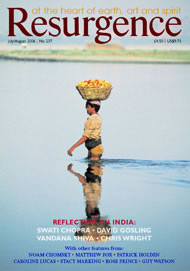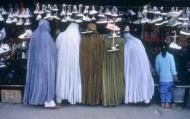PICTURE A COUNTRY in which women have no vote and in which few are employed outside the home. A country in which, through conviction or social pressure, most people attend religious gatherings once a week; in which the state religion and the law ban homosexuality; where there are powerful religious movements urging abstinence from alcohol; where it is normal for women over thirty to wear black, and where they only appear in public if their bodies are completely covered; in which married women have only recently acquired property rights; and in which there is a strong social stigma against divorce, illegitimacy, and any form of sexual activity outside marriage.
Saudi Arabia? Pakistan? Iran? No – this is a picture of Britain in 1900. (In modern Iran and Pakistan at least, many of the above are not true.) A century ago many of the things we in Britain criticise today in other parts of the world, particularly concerning the treatment of women, held true in our own country. Viewed from this perspective, those restrictive social and political forms look quite normal, and the changes that have taken place in Britain and other Western countries since then can be seen as a huge experiment in human personal freedom, the consequences of which are still being worked through.
From the traditional perspective, Islamic or otherwise, many features of modern Western society look dangerous, ugly or repellent: rampant materialism, widespread family breakdown, sexual promiscuity, drug addiction, the universal display of women’s bodies in images in public to sell merchandise, and news and entertainment media in which violence, paedophilia and a variety of other problems and abuses are exaggerated and portrayed as commonplace. Nevermind whether this picture of Western society as shallow and materialistic is accurate – it is one which many outside the West, and many Muslims within the West have acquired, partly as a result of the way in which we in the West choose to present ourselves through our media and advertising. To many in more traditional societies the Western way of life looks both seductive and aggressive, and its global success is an affront.
Almost any genuine religious movement through history would have condemned this society thus portrayed. It is not surprising that many Muslims do so, nor that some extremists carry their disapproval beyond condemnation into violence. Yet we were surprised to find that the perpetrators of the London bombings were Muslims raised and educated within Britain. After the bombings, Tony Blair said there was a battle of ideas to be fought, but he presented it as a battle to be fought within the Muslim faith, between those who support violence and those who do not. The battlefield is surely rather broader, and involves the attitude we all have to central Western values and beliefs.
In the last forty years or so a strange loss of confidence or loss of faith has made us reticent and confused about the values Western countries are supposed to stand for, which underpinned the great social changes we have undergone. The ugliness and materialism blare out across the world; the values of justice and liberty slink into the shadows. We take them for granted, roll our eyes when politicians we don’t respect invoke them for the nth time, and recoil from making idealistic statements ourselves. Behind the words of the politicians, our commitment to the principles on which our society is based has been hollowed out. Instead most of us tend to articulate an ironic, cynical relativism that undermines those values and has hardly any practical content at all. That cynicism registers in the wider world and is played back to us in the contempt of extremists. We earnestly (and rightly) teach our children about the past sins of the West, about slavery, colonial exploitation, industrial poverty, and so on, but little or nothing about the struggle to establish free institutions in the West. Oddly, considering how central Britain is to that story, it is in our country that least is said about it. In France it is considered important to educate children about the Enlightenment, its thinkers and its values. In the US they salute the flag in schools and explain the constitution. In Britain, whose institutions largely inspired the thinkers and the revolutions in both the US and France, we teach children about the spinning-jenny.
Recent initiatives to teach citizenship have run into the arid sand of educationalist jargon and the lowest common denominator. The right way to do it, as David Starkey and Simon Schama have demonstrated in their popular television series, is to learn once again how to tell the stories in which our national history is so rich. We should teach how values of tolerance, decency, justice, freedom and democracy struggled to prominence in the political system of this country. No myths, no jingoism, no pretence that at the time of Magna Carta or subsequently anyone had a blueprint to bring those things about, but just how and with what difficulty and with what false turns and setbacks it did come about. And how those ideas were spread around the world.
If we want our great experiment in freedom to confound its enemies, to win the battle of ideas, it is essential to relearn how to celebrate and argue for our values and their genesis in this way. Otherwise we surrender the field to the blend of hate and ignorance revealed in the attitudes of the London bombers and other so-called Islamic extremists. It is, after all, a great story: something worth arming children with against the false gods of fanaticism and intolerance, of whatever kind. Something like it used to be called the Whig idea of history.
The young Muslims who carried bombs onto the tube did not reject Western values in favour of extremist Islam. They, like the rest of our young people, were never taught about Western values. Did we think they would somehow just pick them up? It is natural for young people to be critical of the world around them, to look for explanations and firm values to live by. Those young Muslims grew up in an environment in which they felt alienated from a Western way of life that appeared corrupt and valueless, where the only strong, confident set of values on offer were extremist Islamic ones. This is the real battlefield of ideas, and we need to get serious about it.
QUOTES
To many in more traditional societies the Western way of life looks both seductive and aggressive, and its global success is an affront.
If we want our great experiment in freedom to confound its enemies, to win the battle of ideas, it is essential to relearn how to celebrate and argue for our values and their genesis.








